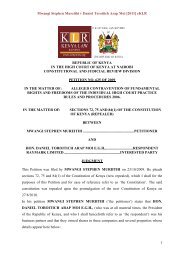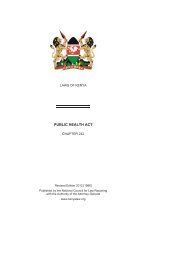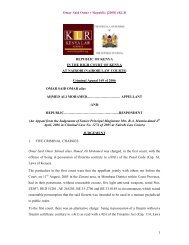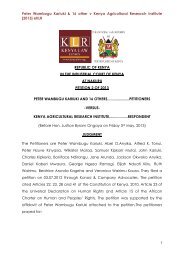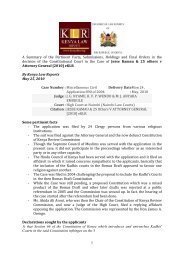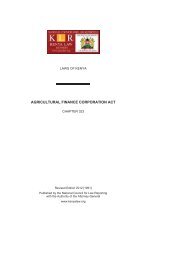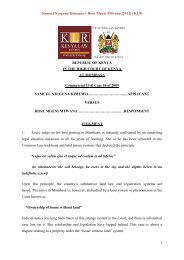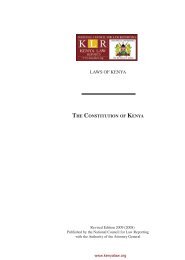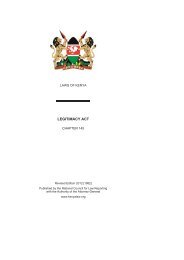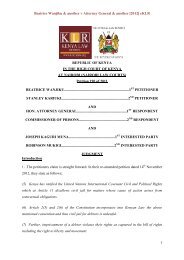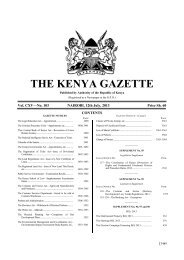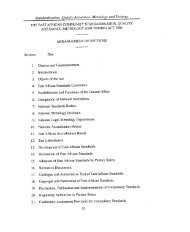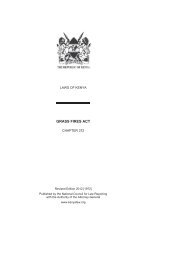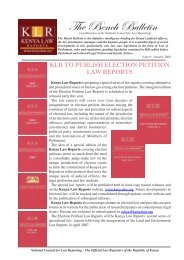Bench Bulletin - Issue 12 - Kenya Law Reports
Bench Bulletin - Issue 12 - Kenya Law Reports
Bench Bulletin - Issue 12 - Kenya Law Reports
Create successful ePaper yourself
Turn your PDF publications into a flip-book with our unique Google optimized e-Paper software.
KENYA LAW REPORTS<br />
BENCH BULLETIN<br />
FEATURE CASE<br />
The Constitutionality of the Kadhi’s Courts<br />
Jesse Kamau & 25 others v Attorney General [2010] eKLR<br />
Misc. Civil Application 890 of 2004<br />
High Court at Nairobi<br />
JG Nyamu JA & RVP Wendo, MJA Emukule JJ<br />
May 24, 2010<br />
This was an application filed in 2004 by 24 Clergy persons from various religious institutions challenging the proposal<br />
to include the Kadhi’s Courts in the then Proposed New Constitution of <strong>Kenya</strong> (commonly referred to as the Zero Draft<br />
or the Bomas Draft). The suit was filed against the Attorney General and the now defunct Constitution of <strong>Kenya</strong> Review<br />
Commission. Though the Supreme Council of Muslims was served with the application, it did not participate in the<br />
proceedings whether as an interested party or in any other capacity. The Hindu Council of <strong>Kenya</strong> had been served with<br />
the application and it filed an affidavit in which it raised concerns sympathetic to the applicants, basically that inclusion<br />
of the Kadhis courts in the Bomas Draft appeared to favour one religion against another. While the hearing of the<br />
application was pending, the Proposed Constitution was rejected at a public referendum in 2005 and the Commission<br />
was wound up. In fact, the hearing of the case started after the referendum had been done. Ms. Abida Ali Aroni, who<br />
was then the Chair of the Constitution of <strong>Kenya</strong> Review Commission (and at the time of the judgment a Judge of the<br />
High Court) filed a replying affidavit opposing the application. The Commission was represented by the Hon. James A.<br />
Orengo while the state was represented by Mr. A. Ombwayo, Principal Litigation Counsel.<br />
Among the declarations sought by the applicants:<br />
• That Section 66 of the Constitution of <strong>Kenya</strong> which introduces and entrenches Kadhis’ Courts in the Constitution<br />
infringed on the Constitutional rights of the applicants to equal protection of the law embodied in sections,<br />
70, 78, 79, 80 and 82 of the Constitution and to that extent was discriminatory, unconstitutional and should<br />
be expunged in its entirety from the Constitution;<br />
• That section 66 of was inconsistent with section 82 of the same Constitution and was therefore null and void;<br />
• That any provision similar to section 66 of the Constitution of <strong>Kenya</strong> in word or effect as proposed in the draft<br />
otherwise known as the “Zero” or “Bomas Draft” or any other draft infringed on the right of the applicants and<br />
was discriminatory, unconstitutional, null and void and of no effect;<br />
• That the enactment of the Kadhis’ Courts Act contravened the Constitution and was to that extent null and<br />
void;<br />
• That the financial maintenance and support of the Kadhis’ Courts from public coffers amounted to segregation,<br />
was sectarian, discriminative, unjust and amounted to separate development of one religion and religious<br />
practice and therefore unconstitutional.<br />
Some pertinent arguments<br />
• Jurisdiction: The state argued that the High Court had no jurisdiction to strike out section 66 of the Constitution<br />
and that the court had only jurisdiction to strike out a law other than a provision of the Constitution. Counsel<br />
urged that section 66 of the Constitution is an existing provision and cannot be struck out as being contrary to<br />
section 3 of the Constitution as no provision of the Constitution is superior or inferior to any other provision<br />
of the Constitution. It was argued that an order of the court nullifying any provision of the Constitution would<br />
itself be unconstitutional.<br />
• Separation of powers: That the application itself was an infringement of the doctrine of the separation of<br />
powers as envisaged under section 23 and 24 of the Constitution and that the doctrine of a secular state was<br />
not clearly defined in the Constitution.<br />
• That section 66 of the Constitution could only be altered in the manner prescribed by sections 46-49 of the<br />
Constitution, namely, through Bills passed by the National Assembly and assented to by the President. Counsel<br />
also argued that the Judicature was itself a creature of the Constitution and it had no power itself to alter any<br />
entrenched or other provision of the Constitution.<br />
• It was argued on behalf of the Commission that at the time the application was filed, the question whether<br />
or not it would be right to entrench the Kadhis’ Courts in the proposed Constitution was under negotiation<br />
before the Commission, Parliament, the Referendum and the President, and that these government organs were<br />
better suited to resolve the issue. Counsel for the Commission therefore submitted that the subject matter of<br />
the application was an issue beyond the courts and judicial processes.<br />
<strong>Issue</strong> <strong>12</strong>: April-June 2010<br />
29



